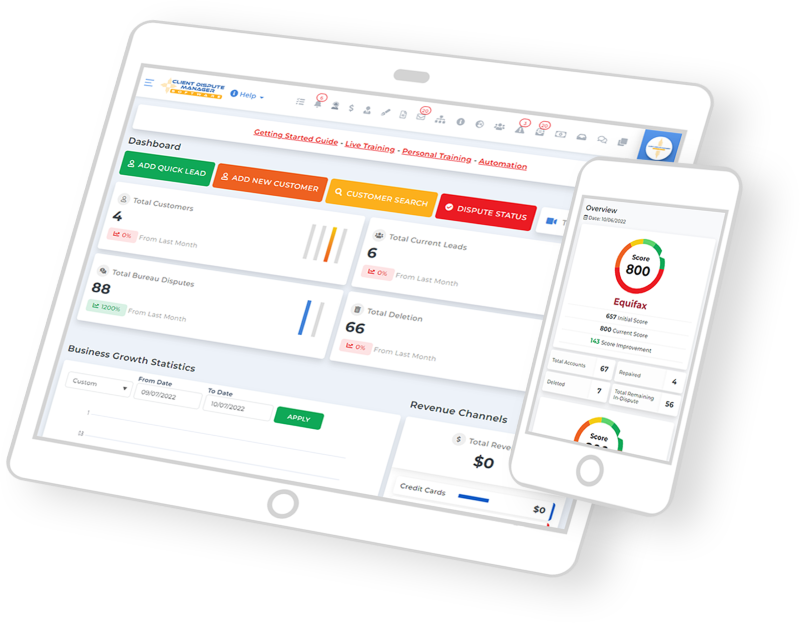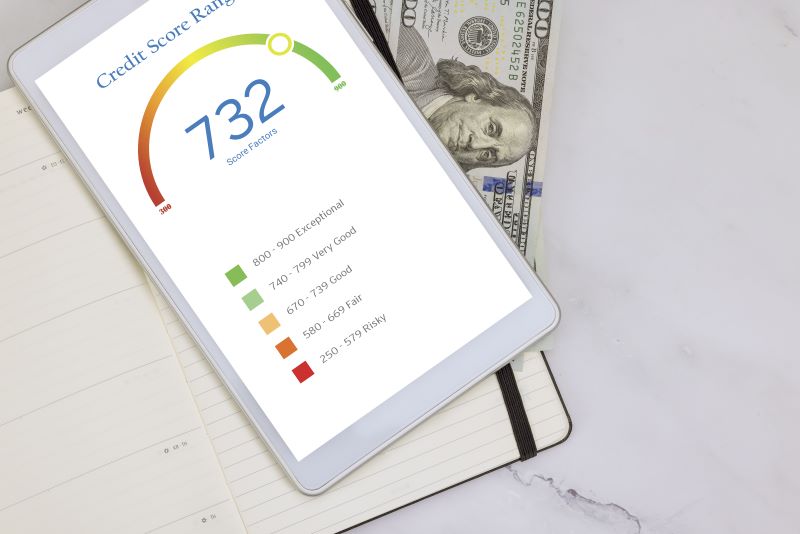Are you tired of being held back by a less-than-stellar credit score? Do you dream of accessing better loan terms, lower interest rates, and greater financial opportunities? In this comprehensive guide on Improving Your Credit Score, we’ll walk you through proven strategies to boost your credit score and unlock the doors to financial success.
By following these credit score improvement tips, you can learn how to improve your credit score and achieve your financial goals.
Understanding Your Credit Score
Your credit score is a three-digit number that reflects your creditworthiness in the eyes of lenders. It is calculated based on factors such as your payment history, credit utilization, length of credit history, types of credit, and recent credit inquiries. The most commonly used credit scoring model is the FICO score, which ranges from 300 to 850. Knowing how to improve your credit score starts with understanding the factors that influence it.
The Components of Your Credit Score
To effectively improve your credit score, it’s essential to understand the factors that influence it. Here’s a breakdown of the key components:
- Payment History (35%): Your record of paying bills on time is the most significant factor in improving your credit score. Late payments, missed payments, and collections can have a major negative impact. Adhering to the best credit score improvement tips, like setting up payment reminders, plays a crucial role here.
- Credit Utilization (30%): This refers to the amount of credit you’re using compared to your credit limits. Keeping your utilization low, ideally below 30%, demonstrates responsible credit management and is one of the key strategies to boost your credit score fast.
- Length of Credit History (15%): The longer you’ve had credit accounts open and in good standing, the better it is for your score. This includes the age of your oldest account and the average age of all your accounts, enhancing your higher credit score strategy.
- Credit Mix (10%): Having a diverse mix of credit types (e.g., credit cards, installment loans, mortgages) can show lenders that you can handle different types of debt responsibly. This diversity is an integral part of credit improve tips.
- New Credit Inquiries (10%): Each time you apply for credit, a hard inquiry is made on your credit report. Too many hard inquiries in a short period can temporarily lower your score. Limiting new inquiries is a recommended way to increase your credit score.
Why Your Credit Score Matters?

A high credit score can open up a world of possibilities. It can help you:
- Qualify for lower interest rates on loans and credit cards
- Secure better terms on rental agreements and utility services
- Improve your chances of landing a job or getting approved for an apartment
- Access higher credit limits and more favorable financial products
On the flip side, a low credit score can lead to higher interest rates, difficulty obtaining credit, and limited financial opportunities. That’s why taking steps to improve your credit score is crucial for your financial well-being. By implementing these credit score improvement tips and following strategies to boost your credit score fast, you can work towards achieving your financial goals.
Strategies to Improving Credit Score
As you work towards achieving a healthier financial status, improving your credit score is crucial. Enhancing your credit can open doors to better loan terms, lower interest rates, and increased borrowing power. Below, we explore eight effective strategies to boost your credit score. These methods focus on managing your finances more effectively and optimizing your credit profile, ensuring you can leverage opportunities to secure your financial future.
Pay Your Bills on Time
Late payments can significantly damage your credit score. To avoid this, setting up automatic payments or reminders is an effective credit improve tip to ensure you never miss a due date. If you’re struggling to keep up with bills, contacting your creditors to discuss potential payment plans or hardship programs can help. Consistently paying your bills on time is one of the best strategies to boost your credit score fast.
Late payments can remain on your credit report for up to seven years, emphasizing the importance of making timely payments. Even a single late payment can cause your credit score to drop substantially, especially if you already have a high credit score. The longer a payment remains overdue, the more severe the impact on your credit score, which underscores the necessity of a higher credit score strategy.
If a payment is missed, it’s crucial to catch up as soon as possible. The quicker you bring your account current, the less impact it will have on your credit score over time. Implementing these credit score improvement tips can aid in managing your credit more effectively, reducing the likelihood of lasting negative effects from late payments.
Keep Your Credit Utilization Low

High credit utilization can signal to lenders that you’re overextended and may have trouble managing your debt. Aim to keep your utilization below 30% across all your credit accounts. This is one of the most effective credit score improvement tips. Some strategies to achieve this include:
- Paying down credit card balances
- Asking for credit limit increases
- Spreading purchases across multiple cards
- Using a personal loan to consolidate high-interest credit card debt
The Relationship Between Credit Utilization and Your Credit Score
Credit utilization is calculated by dividing your total credit card balances by your total credit limits. For example, if you have two credit cards with a combined limit of $10,000 and balances totaling $3,000, your credit utilization is 30%.
High credit utilization can lower your credit score because it suggests that you may be relying too heavily on credit to make ends meet. On the other hand, low credit utilization shows that you’re using credit responsibly and not overspending.
One strategy to keep your utilization low is to pay your credit card balances in full each month. If that’s not possible, making multiple payments throughout the month can help keep your balances down and improve your credit utilization ratio.
Don't Close Old Credit Accounts
The length of your credit history makes up 15% of your FICO score. This factor takes into account the age of your oldest credit account, the age of your newest account, and the average age of all your accounts.
A longer credit history gives lenders more information to assess your creditworthiness. It shows that you have experience managing credit over an extended period, which can be a positive signal to lenders.
Closing an old credit account can shorten your average credit history length, which may negatively impact your score. If you have an old credit card that you no longer use, consider keeping it open and using it occasionally for small purchases that you pay off immediately. This can help keep the account active and maintain your credit history length.
Mix Up Your Credit Types
While credit mix only makes up 10% of your FICO score, it’s still an important factor to consider. Having a variety of credit types can show lenders that you have experience managing different kinds of debt, such as revolving credit (credit cards) and installment loans (mortgages, car loans, student loans).
A diverse credit mix can be particularly beneficial if you have a short credit history. By successfully managing multiple types of credit, you can demonstrate your creditworthiness even without a long track record.
However, it’s important not to take on new credit solely for the sake of improving your credit mix. Only apply for credit that you need and can afford to repay. Taking on too much debt can have a negative impact on your credit score and overall financial health.
Limit New Credit Applications To Improving Credit Score
When you apply for credit, the lender will typically perform a hard inquiry on your credit report to assess your creditworthiness. Hard inquiries can temporarily lower your credit score by a few points, as they signal that you’re seeking new credit.
The impact of a single hard inquiry is usually minimal and short-lived. However, multiple hard inquiries in a short period (e.g., applying for several credit cards or loans within a few months) can have a more significant negative impact on your score.
To minimize the effect of hard inquiries, only apply for credit when you truly need it. If you’re shopping around for the best rates on a loan, try to do all your applications within a short period (e.g., 14-45 days), as multiple inquiries for the same type of credit within this timeframe are typically treated as a single inquiry.
Check Your Credit Report for Errors

Mistakes on your credit report, such as incorrect account information or fraudulent activity, can drag down your score. Review your credit report regularly and dispute any errors you find. You are entitled to one free copy of your credit report from each of the three major credit bureaus (Equifax, Experian, and TransUnion) every 12 months.
When reviewing your credit report, keep an eye out for these common errors:
- Accounts that don’t belong to you
- Incorrect account balances or credit limits
- Accounts incorrectly reported as late or delinquent
- Duplicate accounts
- Accounts that should have aged off your report (most negative items should be removed after seven years)
If you find an error on your credit report, you have the right to dispute it with the credit bureau. The bureau must investigate your claim and remove any inaccurate information. Be sure to provide documentation supporting your dispute, such as account statements or receipts.
Become an Authorized User
When you become an authorized user on someone else’s credit card account, the account’s history is reported on your credit report as if it were your own. If the primary account holder has a strong payment history and low credit utilization, this can positively impact your credit score.
Being an authorized user can be particularly helpful if you have a limited credit history or are working to rebuild your credit after past mistakes. However, it’s important to choose your primary account holder carefully. If they miss payments or carry high balances, this negative activity will also be reported on your credit report and could hurt your score.
Before becoming an authorized user, have a candid conversation with the primary account holder about their credit habits and make sure you’re on the same page about how the account will be used.
Credit Builder Loan
Credit-builder loans are designed to help you build credit through positive payment history. When you take out a credit-builder loan, the lender deposits the loan amount into a savings account that you can’t access until you’ve paid off the loan.
You make monthly payments to the lender, which are reported to the credit bureaus. Once you’ve paid off the loan, you receive the money in the savings account. Credit builder loans are a good option if you want to build credit but don’t need immediate access to funds.
Like secured credit cards, credit-builder loans are easier to qualify for than traditional loans because they’re designed for people with limited or poor credit. They can be a valuable tool for establishing a positive payment history and improving your credit score over time.
Streamline Your Credit Repair Process with Client Dispute Manager Software

Client Dispute Manager Software is a specialized tool designed to streamline the credit repair process. It provides a centralized platform for managing client information, tracking dispute progress, generating dispute letters, and communicating with clients and credit bureaus.
Key features of Client Dispute Manager Software often include:
- Secure client information storage
- Customizable dispute letter templates
- Automated dispute status tracking
- Integrated credit report importing and analysis
- Client portal for easy communication and document sharing
Billing and invoicing functionality
By investing in the right Client Dispute Manager software, you can streamline your credit repair process, improve client satisfaction, and position your business for long-term success. As you help your clients navigate the path to better credit, this powerful tool can be an invaluable asset in your mission to provide expert guidance and support.
Frequently Asked Questions (FAQs)
How Long Does It Take To Improve My Credit Score?
The time it takes to see significant improvements in your credit score depends on your starting point and the specific actions you take. Some strategies, like paying down high credit card balances, can yield results within a few months. Others, like building a long history of on-time payments, may take several months to a year or more to reflect in your score. Consistency is key when working to increase your credit score.
Can I Repair My Credit On My Own, Or Do I Need To Hire A Professional?
While credit repair companies can offer guidance and assistance, many of the steps to improve your credit score can be done on your own. By consistently practicing responsible credit habits and monitoring your credit report regularly, you can make significant progress in boosting your score without incurring the costs of hiring a professional. Implementing credit improve tips and following strategies to boost your credit score fast can help you achieve your goals.
Will Closing A Credit Card Account Help My Credit Score?
Contrary to popular belief, closing a credit card account can actually hurt your credit score in the short term. When you close an account, you lose that account’s credit limit, which can increase your overall credit utilization ratio if you carry balances on other cards. Additionally, closing an older account can shorten your average credit history length. In most cases, it’s better to keep credit card accounts open, even if you’re not actively using them.
How Can I Get A Copy Of My Credit Report?
You are entitled to one free copy of your credit report from each of the three major credit bureaus (Equifax, Experian, and TransUnion) every 12 months. You can request your free reports at Annual Credit Report. Additionally, many credit card issuers and financial institutions now offer free credit score monitoring as a benefit to their customers. Regularly reviewing your credit report is an essential part of any higher credit score strategy.
Conclusion
Improving your credit score takes time, effort, and patience, but the rewards are well worth it. By implementing these proven strategies and staying committed to responsible credit management, you can gradually transform your credit profile from average to excellent. As you watch your score climb, you’ll unlock access to better financial opportunities and greater peace of mind.
Remember, your credit score is not a reflection of your character or worth as a person – it’s simply a tool that you can learn to master with the right knowledge and habits. Start your journey to credit success today, and enjoy the benefits of a brighter financial future.

Mark Clayborne
Mark Clayborne specializes in credit repair, starting and running credit repair businesses. He's passionate about helping businesses gain freedom from their 9-5 and live the life they really want. You can follow him on YouTube.
Below Is More Content For Your Review:
- How to Negotiate with Debt Collectors: 5 Top Strategies Revealed!
- The Ultimate Guide to Credit Repair Business Marketing: Tips, Tricks, and Trends

